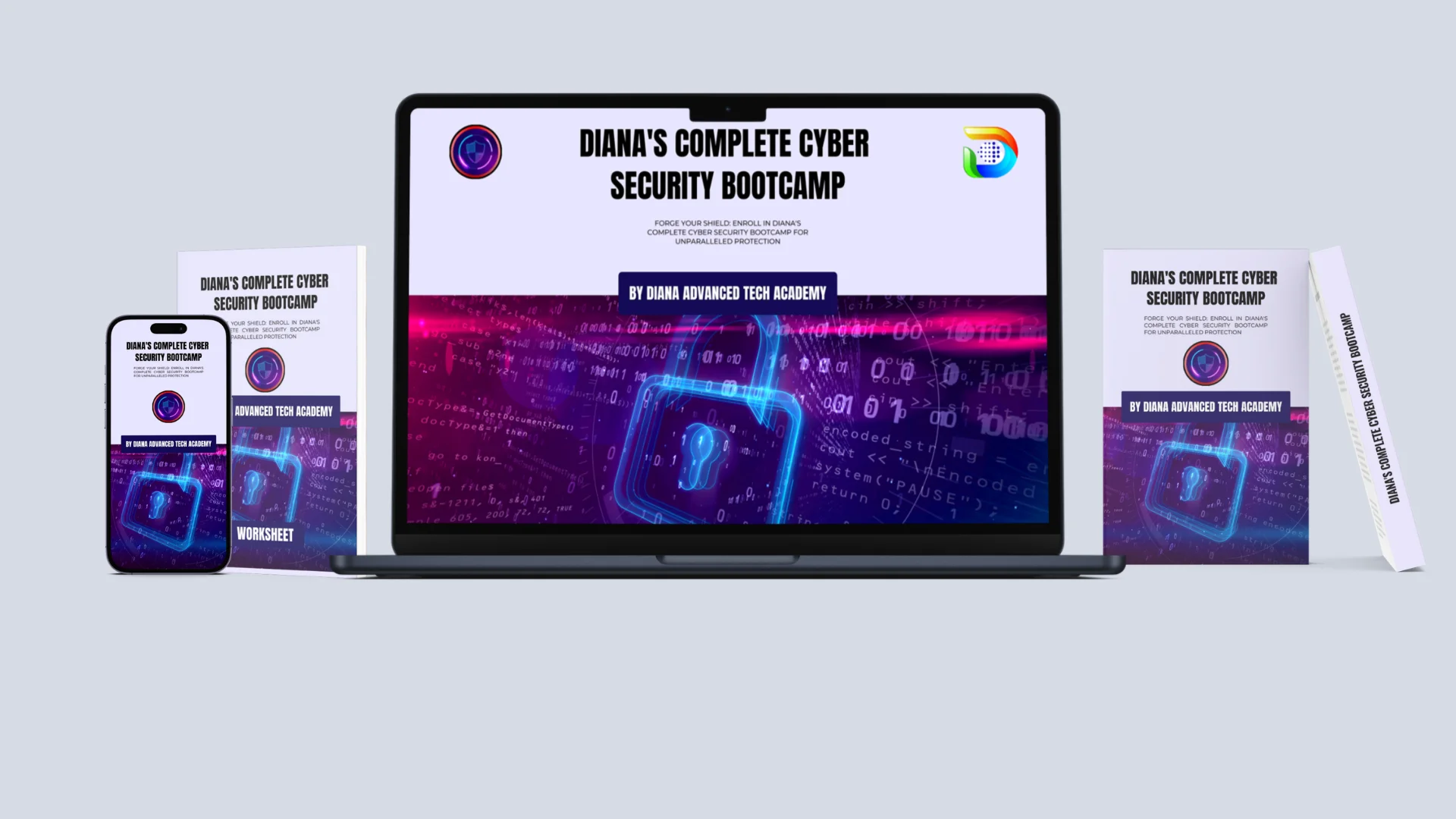
About Course
What Will You Learn?
- 1. **Cybersecurity Fundamentals**: Understand the basic principles, concepts, and terminology of cybersecurity, including the CIA triad (Confidentiality, Integrity, Availability) and common cybersecurity frameworks.
- 2. **Networking Basics**: Learn about networking fundamentals, including TCP/IP protocols, subnetting, routing, and switching, to understand how data flows across networks and how to secure network infrastructure.
- 3. **Operating System Security**: Explore security features and best practices for securing various operating systems (Windows, Linux, macOS) to protect against common threats and vulnerabilities.
- 4. **Cyber Threats and Attacks**: Identify and understand different types of cyber threats, including malware, phishing, ransomware, DDoS attacks, and insider threats, and learn how to detect, prevent, and mitigate them.
- 5. **Ethical Hacking and Penetration Testing**: Learn ethical hacking techniques and methodologies for conducting penetration tests, vulnerability assessments, and security audits to identify and remediate security vulnerabilities.
- 6. **Web Application Security**: Understand common web application vulnerabilities, such as SQL injection, cross-site scripting (XSS), and insecure direct object references, and learn how to secure web applications against these threats.
- 7. **Cloud Security**: Explore security considerations and best practices for securing cloud environments, including Infrastructure as a Service (IaaS), Platform as a Service (PaaS), and Software as a Service (SaaS) deployments.
- 8. **Identity and Access Management (IAM)**: Learn about IAM concepts, including authentication, authorization, and access control, and explore techniques for managing user identities and access privileges effectively.
- 9. **Incident Response and Forensics**: Develop skills in incident response planning, detection, analysis, containment, eradication, and recovery, as well as digital forensics techniques for investigating security incidents and breaches.
- 10. **Security Operations and Monitoring**: Understand the role of security operations centers (SOCs) and learn how to monitor and analyze security events, alerts, and logs to detect and respond to security incidents effectively.
- 11. **Security Compliance and Governance**: Explore regulatory compliance requirements, industry standards, and cybersecurity laws, and learn how to develop and implement security policies, procedures, and controls to ensure compliance.
- 12. **Cybersecurity Tools and Technologies**: Gain hands-on experience with a variety of cybersecurity tools and technologies, including firewalls, intrusion detection systems (IDS), intrusion prevention systems (IPS), antivirus software, SIEM solutions, and more.
Course Modules
Introduction
Introduction To Cyber Security & History
-
Short History of Cyber Security
00:00 -
Cyber Security Roles
00:00 -
How to Approach the Cyber Security field
00:00
Cybersecurity Basic Theory and Goals
-
How Companies Get Hacked
00:00 -
Cyber Security News
00:00 -
Red Team Vs Blue Team
00:00
Understand Hackers – The Biggest Threat
-
White Hat, Black Hat, Gray Hat
00:00 -
Biggest Data Breaches
00:00 -
How Does Typical Malware Work
00:00
Security Bugs & Vulnerabilities
-
What is a Vulnerability
00:00 -
Most Common Vulnerabilities
00:00 -
Unpatched Machine Exploitation Demonstration
00:00 -
Preventing Vulnerabilities
00:00 -
Resources for Buffer Overflows
00:00 -
Buffer Overflow Demonstration
00:00
Social Engineering Basics
-
Social Engineering Attacks
00:00 -
How To Recognize Phishing Emails
00:00 -
Tools For Analyzing Phishing Attacks
00:00 -
Summary Of Social Engineering
00:00
End-Point Protection
-
End-Point Protection Introduction
00:00 -
Firefox Security and Hardening
00:00 -
Brave Browser Security and Privacy
00:00 -
Brave Browser Security and Privacy
00:00 -
Brave Browser Security and Privacy
00:00 -
Default Windows Security
00:00 -
MacOS XProtect and MRT
00:00 -
Bitdefender, Kaspersky, McAfee, Malwarebytes
00:00 -
Password Security and Password Managers
00:00 -
Keepass
00:00 -
LastPass, NordPass, and 1Password
00:00 -
File and Disk Encryption
00:00 -
Process Explorer
00:00 -
Netstat and Wireshark
00:00 -
Htop
00:00 -
Rootkit Hunter
00:00 -
Host Based Firewalls
00:00 -
Iptables
00:00 -
Windows Defender Firewall
00:00 -
Macos Firewall
00:00 -
How To Securely Erase Files on Windows Linux Macos
00:00 -
End-Point Security Recap
00:00
Network Security
-
Network Security Introduction
00:00 -
Network Firewalls Theory
00:00 -
Different Network Firewalls
00:00 -
Network Scanning and Discovering Vulnerabilities
00:00 -
Network Security With Nmap
00:00 -
Discovering Vulnerabilities With Nessus
00:00 -
Scanning Windows 7 Machine With Nessus
00:00 -
Routersploit
00:00 -
Router Default Credentials
00:00 -
Secure Network Architecture
00:00 -
Wireless Security
00:00 -
Wireless Attack Demonstration
00:00 -
Network Monitoring With TCPDump
00:00 -
Common Network Attacks
00:00
Cyber Security Strategies
-
Protect and Recover Strategy
00:00 -
Endpoint Protection Strategy
00:00 -
Application Centric Strategy
00:00 -
Identity Centric Strategy
00:00 -
Data Centric Strategy
00:00 -
Attack Centric Strategy
00:00
How We Are Tracked
-
IP Tracking
00:00 -
Cookies and Browser Tracking
00:00 -
Exercise – Imposter Syndrome
00:00 -
Different Types of Tracking
00:00
Anonymity & Privacy
-
Anonymity Theory
00:00 -
Tor Browser
00:00 -
Proxychains With Different Tools
00:00 -
Installing VPN for Kali
00:00 -
Whoami Anonymity Tool
00:00 -
Steps to be as Anonymous as Possible
00:00
Appendix – Ethical Hacking
-
5 Stages Of A Penetration Test
00:00 -
Obtaining IP Address, Physical Address Using Whois Tool
00:00 -
Whatweb Stealthy Scan
00:00 -
Gathering Emails Using theHarvester & Hunter.io
00:00 -
Theory Behind Scanning
00:00 -
TCP & UDP
00:00 -
Netdiscover
00:00 -
What is Exploitation
00:00 -
Reverse Shells, Bind Shells
00:00 -
Msfconsole Basic Commands
00:00 -
Our First Exploit – vsftp 2.3.4 Exploitation
00:00 -
Software Vulnerability – Samba Exploitation
00:00 -
Generating Basic Payload With Msfvenom
00:00 -
Advance Msfvenom Usage
00:00 -
Post Exploitation Theory
00:00 -
Meterpreter Basic Commands Part 1
00:00 -
Meterpreter Basic Commands Part 2
00:00
Where To Go From Here
-
Thank You!
00:00
Student Ratings & Reviews

No Review Yet